TEST BENCH AND PROTOCOL
Our testing focus here today is on the data transfer speeds of the ST3000DM001. To see the best storage system performance possible the CPU C states have been disabled, C1E support has been disabled, Enhanced Intel SpeedStep Technology (EIST) has been disabled. Benchmarks for consumer testing are also benchmarks with a fresh drive so that not only can we verify that manufacturer specifications are in line, but also so the consumer can replicate our tests to confirm that they have a drive that is in top-notch condition. We even provide links to most of the benchmarks used in the report.
This Test Bench build was the result of some great relationships and purchase; our appreciation goes to those who jumped in specifically to help the cause. Key contributors to this build are our friends at ASRock for the motherboard and CPU. Also, a big thank you to Thermaltake for the case. We have detailed all components in the table below should you wish to make a duplicate of our system as so many seem to do, or check out the price of any single component. As always, we appreciate your support in any purchase through our Amazon links.
The software we will be using for today’s analysis is typical of many of our reviews and consists of Crystal Disk Info, ATTO Disk Benchmark, Crystal Disk Mark, Anvil’s Storage Utilities, HDTune PRO, PCMark8 and PCMark Vantage. We prefer to test with easily accessible software that the consumer can obtain, and in many cases, we even provide links (just click on the software title in the heading for that section). Our selection of software allows each to build on the last and to provide validation to results already obtained.
Crystal Disk Info is a great tool for displaying the characteristics and health of storage devices. It displays everything from temperatures, to the number of hours the device has been powered, and even to the extent of informing you of the firmware version of the device.
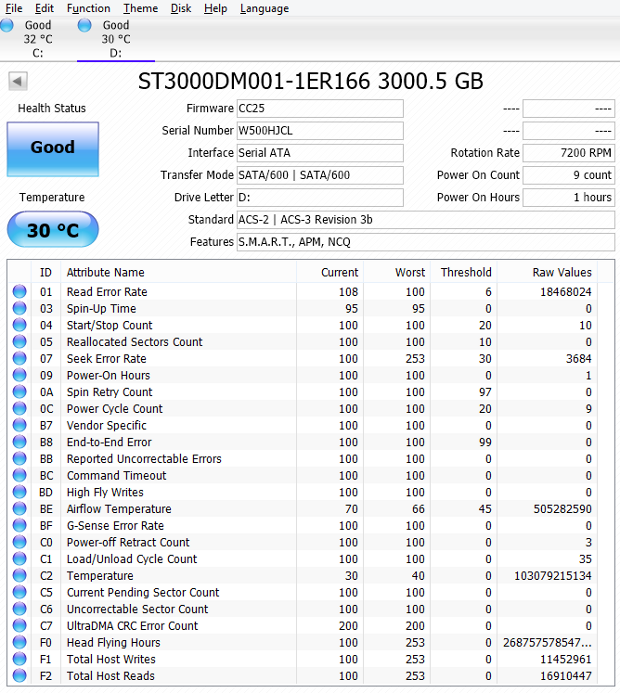 Our ST3000DM001 shows in Crystal Disk Info as being in good health, and shows that S.M.A.R.T. drive status and health monitoring attributes are enabled, as well as APM (advanced power management) and NCQ (native command queueing). NCQ is a feature that optimizes the drive’s read and write paths, which allows the drive to spend less time spinning and increases performance, which is especially helpful for multitasking efforts.
Our ST3000DM001 shows in Crystal Disk Info as being in good health, and shows that S.M.A.R.T. drive status and health monitoring attributes are enabled, as well as APM (advanced power management) and NCQ (native command queueing). NCQ is a feature that optimizes the drive’s read and write paths, which allows the drive to spend less time spinning and increases performance, which is especially helpful for multitasking efforts.
ATTO DISK BENCHMARK VER. 2.4.7
ATTO Disk Benchmark is perhaps one of the oldest benchmarks going and is definitely the main staple for manufacturer performance specifications. ATTO uses RAW or compressible data and, for our benchmarks, we use a set length of 256MB and test both the read and write performance of various transfer sizes ranging from 0.5 to 8192KB. Manufacturers prefer this method of testing as it deals with raw (compressible) data rather than random (includes incompressible data) which, although more realistic, results in lower performance results.
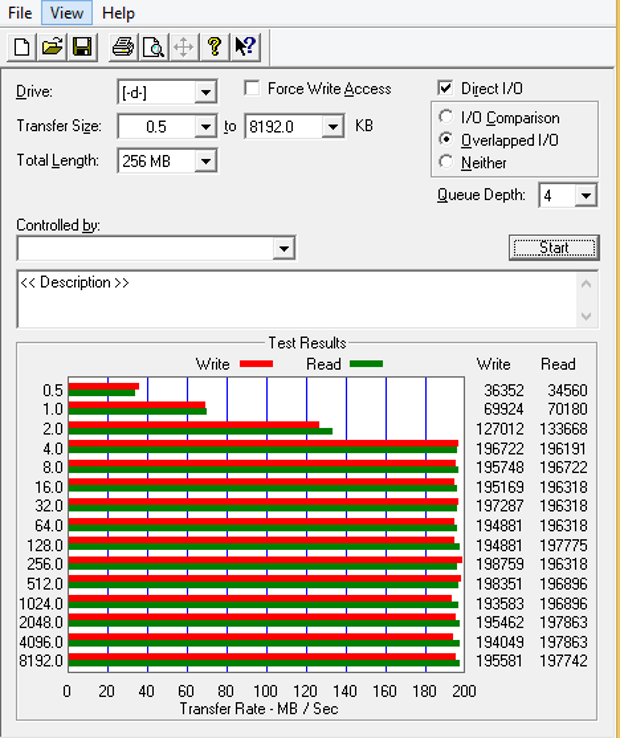 Our ATTO results indicate that the ST3000DM001 attained sequential read speeds of over 197MB/s, and sequential write speeds of over 195MB/s. These speeds were attained at all transfer sizes of 4KB and larger, showing amazingly consistent performance.
Our ATTO results indicate that the ST3000DM001 attained sequential read speeds of over 197MB/s, and sequential write speeds of over 195MB/s. These speeds were attained at all transfer sizes of 4KB and larger, showing amazingly consistent performance.
CRYSTAL DISK BENCHMARK VER. 3.0 X64
Crystal Disk Benchmark is used to measure read and write performance through sampling of random data which is, for the most part, incompressible. Crystal Disk Mark can test with either “zero fill” (compressible) data, or with random (incompressible) data. Performance is virtually identical, regardless of data sample, so we have included only results using random data. Random data is more typical of consumer use.
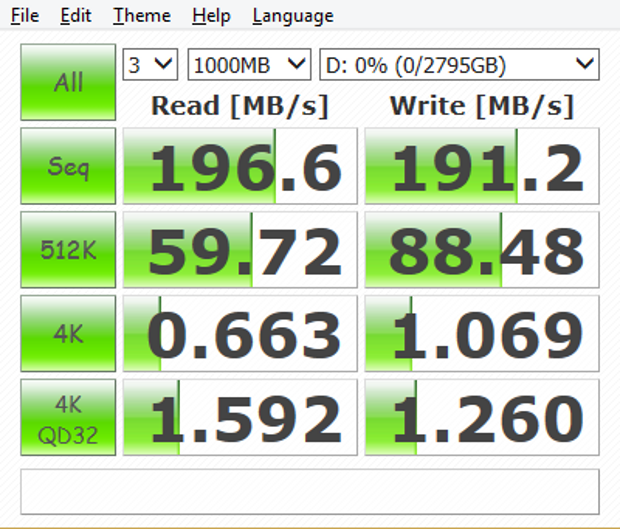 Again we see both sequential reads and writes of over 190MB/s. This is above Seagate’s published speed of 156MB/s for average data transfer rate, but about 5% below the stated maximum sustained data transfer rate of 210MB/s. The five percent difference could easily be due to varying system component configurations. 4K speeds are about typical for HDDs
Again we see both sequential reads and writes of over 190MB/s. This is above Seagate’s published speed of 156MB/s for average data transfer rate, but about 5% below the stated maximum sustained data transfer rate of 210MB/s. The five percent difference could easily be due to varying system component configurations. 4K speeds are about typical for HDDs
ANVIL STORAGE UTILITIES PROFESSIONAL
Anvil’s Storage Utilities (ASU) is the most complete test bed available for storage drives today. The benchmark displays test results for not only throughput, but also IOPS and Disk Access Times. Not only does it have a preset benchmark, but also has included such things as endurance testing and threaded I/O read, write and mixed tests; all of which are very simple to understand and use in our benchmark testing.
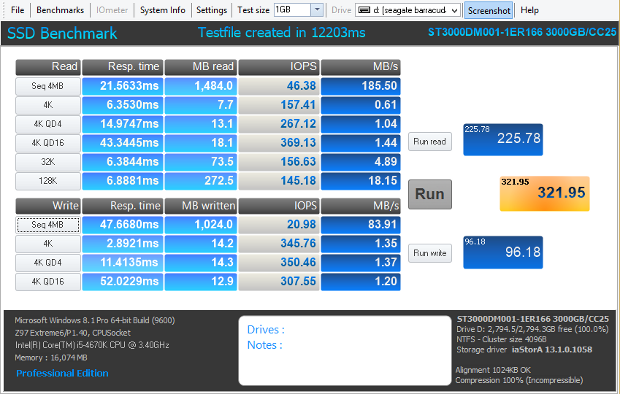 Sequential read speeds with Anvil peaked at a little over 185MB/s, which is still above the stated “average” read speeds. The write speeds drop off quite a bit using Anvil to less than 84MB/s. We have seen lowered write speeds with Anvil on other HDDs also, likely a result of the difference in the write tasks that Anvil uses for measurement as compared to Crystal Disk Mark.
Sequential read speeds with Anvil peaked at a little over 185MB/s, which is still above the stated “average” read speeds. The write speeds drop off quite a bit using Anvil to less than 84MB/s. We have seen lowered write speeds with Anvil on other HDDs also, likely a result of the difference in the write tasks that Anvil uses for measurement as compared to Crystal Disk Mark.
HD Tune is a Hard Disk Utility with many functions, including error checking, health testing (S.M.A.R.T.), drive wiping and of course benchmarking.
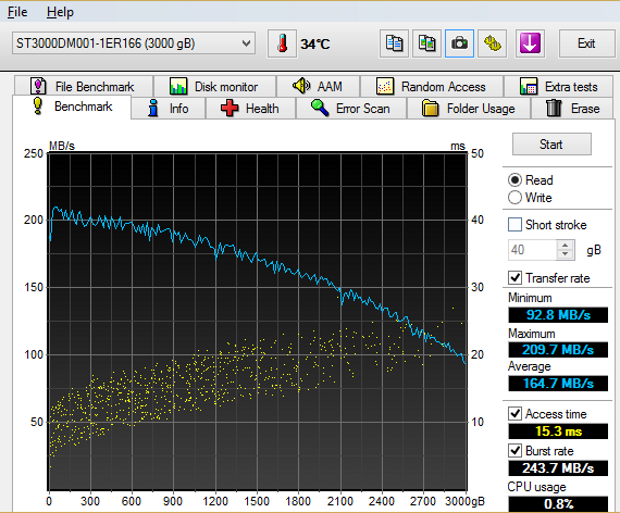 In our HD Tune sequential reads testing run, the ST3000DM001 attained average transfer rates of 164.7MB/s, and maximum transfer rates of 209.7MB/s. The burst test topped out at 243.7MB/s and average access time was 15.3ms. This is the first benchmark where we have seen this drive attain just barely under the published maximum sequential read speed of 210MB/s.
In our HD Tune sequential reads testing run, the ST3000DM001 attained average transfer rates of 164.7MB/s, and maximum transfer rates of 209.7MB/s. The burst test topped out at 243.7MB/s and average access time was 15.3ms. This is the first benchmark where we have seen this drive attain just barely under the published maximum sequential read speed of 210MB/s.
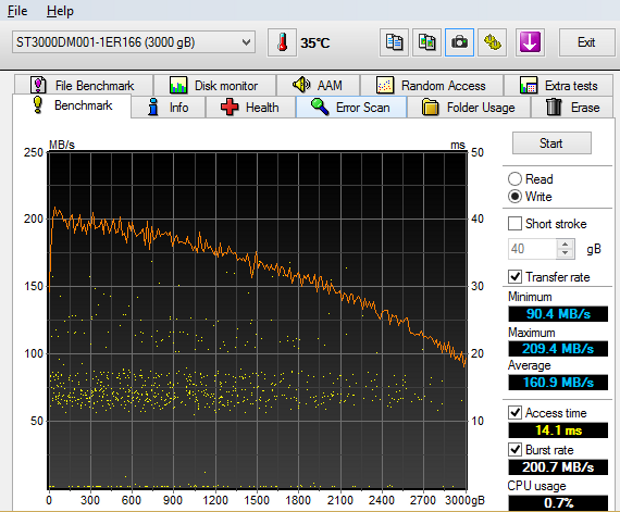 In our HD Tune sequential writes testing, we were able to attain average transfer rates of 160.9MB/s and maximum transfer rates of 209.4MB/s Burst topped out at 200.7MB/s, and average access time was 14.1ms. We have again achieved (within 0.6) the published maximum sequential write speed of 210MB/s.
In our HD Tune sequential writes testing, we were able to attain average transfer rates of 160.9MB/s and maximum transfer rates of 209.4MB/s Burst topped out at 200.7MB/s, and average access time was 14.1ms. We have again achieved (within 0.6) the published maximum sequential write speed of 210MB/s.
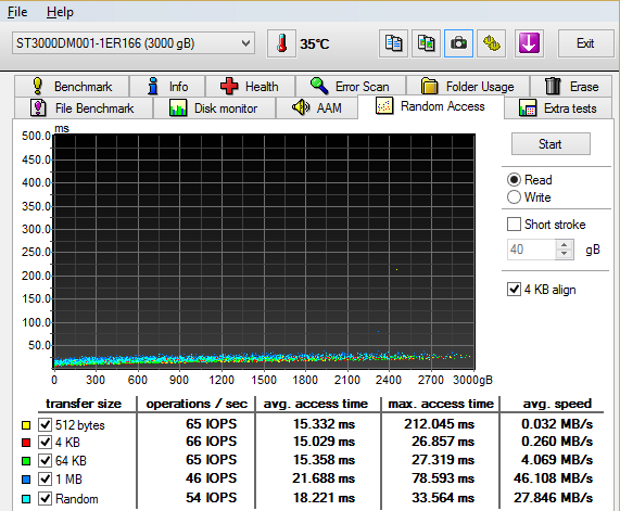 HD Tune random reads averaged 27.8MB/s, with average access times of 18.22ms. This is about average for an HDD in this testing.
HD Tune random reads averaged 27.8MB/s, with average access times of 18.22ms. This is about average for an HDD in this testing.
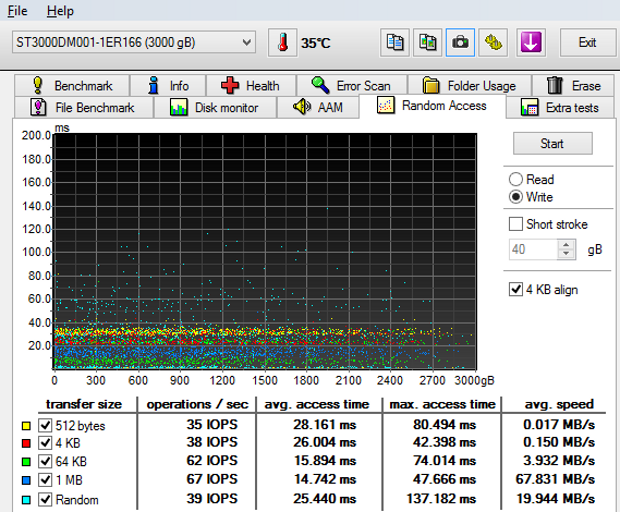 The HD Tune random writes averaged 19.9MB/s, with average access times of 25.44ms. Again, this is comparable to other HDDs.
The HD Tune random writes averaged 19.9MB/s, with average access times of 25.44ms. Again, this is comparable to other HDDs.
The HD Tune extra read testing gives us a little deeper dive into performance of the HDD across the entire platter area, breaking performance down into three “zones” – the “outer” area of the platter, the “middle” area of the platter, and the “inner” area of the platter. The results shown reinforce one aspect of mechanical HDDs – performance will always drop as the read/write heads have to move further to reach the center and inner tracks of the platter(s). Latency increases and performance drops as we move further away from the outer edge toward the inner tracks.
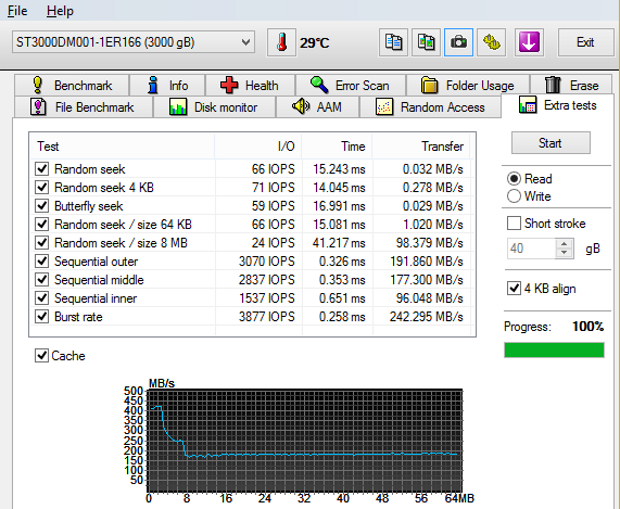 In our HD Tune extra reads testing, sequential “outer” reads were 191.8MB/s, sequential “middle” reads were 177.3MB/s, and sequential “inner” reads were 96.0MB/s. The ST3000MD001 attained a maximum burst speed of 242.3 MBs, while random 8MB seeks speeds were 98.38MB/s. These numbers are quite solid for an HDD.
In our HD Tune extra reads testing, sequential “outer” reads were 191.8MB/s, sequential “middle” reads were 177.3MB/s, and sequential “inner” reads were 96.0MB/s. The ST3000MD001 attained a maximum burst speed of 242.3 MBs, while random 8MB seeks speeds were 98.38MB/s. These numbers are quite solid for an HDD.
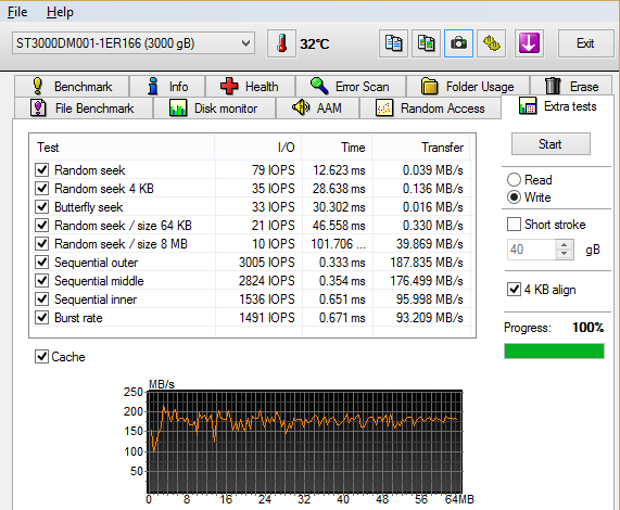 HD Tune extra writes testing produced results of 187.8MB/s for sequential “outer” reads, 176.5MB/s for sequential “middle” reads, and 95.9MB/s for sequential “inner” reads. The maximum burst speed was 93.3MB/s, with random 8MB seek speeds of 39.9MB/s. These numbers are above average as compared to most HDDs.
HD Tune extra writes testing produced results of 187.8MB/s for sequential “outer” reads, 176.5MB/s for sequential “middle” reads, and 95.9MB/s for sequential “inner” reads. The maximum burst speed was 93.3MB/s, with random 8MB seek speeds of 39.9MB/s. These numbers are above average as compared to most HDDs.
Review Overview
Build Quality
Performance
Availability
Warranty
Excellent value for a premium HDD
An excellent choice for fast, large capacity storage! $0.34/GB for 3TB of premium HDD storage!
 Technology X Tomorrow's Technology Today!
Technology X Tomorrow's Technology Today! 
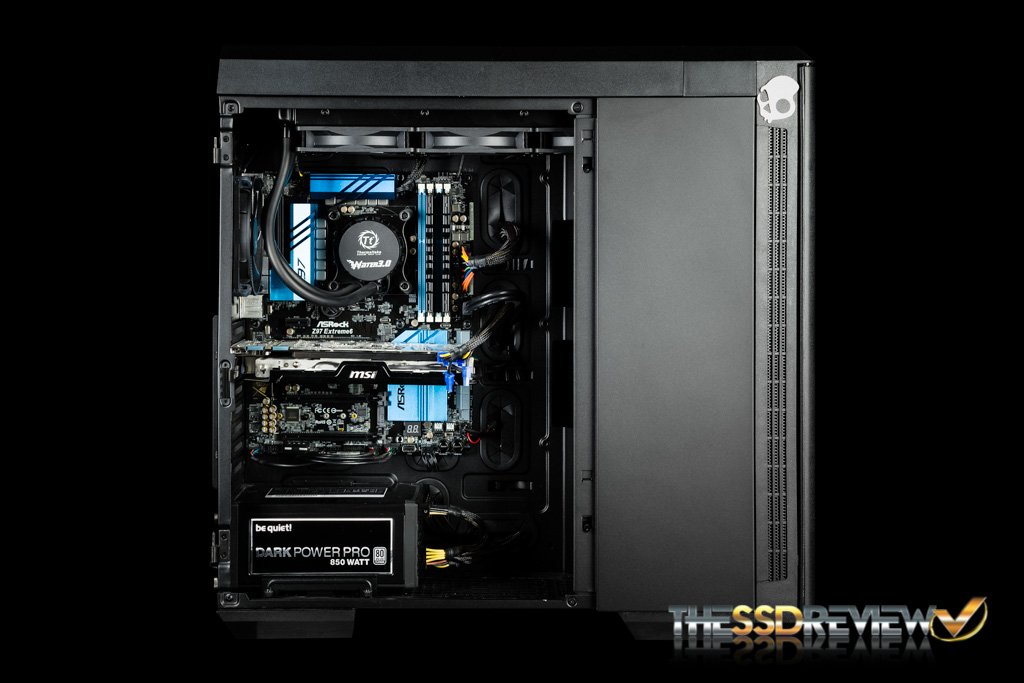
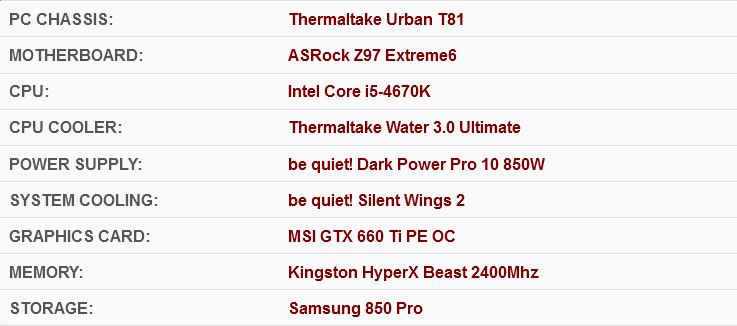
Don’t you mean $0.034c/GB??????
The 2TB version is actually faster……………..
This disk has massive reliability issues and should be avoided like the plague. Google it.
So stick with WD Green or Toshiba 3TB?
I don’t consider myself qualified to recommend a HDD. Just about qualified enough to warn you about the ST3000DM001, because I have experience with a two digit number of them. They are, to put it bluntly, garbage. In fact, most of the ST30000DM001s I have had the displeasure of handling are garbage in the most literal sense at this point, because they have failed. The first few disks that failed managed to take data with them. I quickly learned not to trust this model.
Voted up because I have two failed (40Gb and 250Gb) Seagate HDDs in my home being used as door stoppers. I had thought Seagate might’ve imporved their products :/
I must admit I have had some decent Seagate drives over the years, but the ST3000DM001 model has single-handedly convinced me to avoid Seagate from now on. The mess and anguish this model has caused is too serious to forgive.